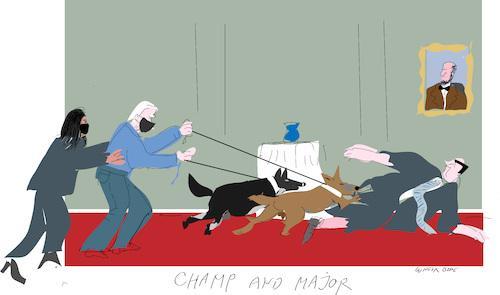Major Liability? Biden’s Dog Bites Another Employee After Returning From Delaware Seclusion
I previously wrote about the historical and legal perspectives of a biting incident involving one of the presidential pets, Major.
Both Biden German Shepherds (Major and Champ) were previously whisked out of town. They were then quietly brought back.
Now Major has bitten another person who reportedly required medical attention. In the prior column, I noted that under tort law a dog is afforded (at most) “one free bite” before strict liability applies. Major could now be treated as a known vicious animal for liability purposes.
Major was adopted in November 2018 from an animal shelter.
The latest incident involved a National Park Service employee who was bitten while on the White House South Lawn on Monday afternoon.
First lady Jill Biden’s press secretary Michael LaRosa told CNN:
“Yes, Major nipped someone on a walk. Out of an abundance of caution, the individual was seen by WHMU and then returned to work.”
The difference between “nipped” and “bitten” is that you are bitten by other people’s dogs. Your dog however only nips, which is somewhere on the spectrum between a lick and a complete devouring.
As noted earlier, there was always question whether Major was entitled to “one free bite.” The “one free bite rule” is a commonly misunderstood torts doctrine — suggesting that you are not subject to strict liability until after the first time your dog bites someone. In fact, you are subject to strict liability whenever you know or have reason to know of the vicious propensity of your animal. That can be satisfied by conduct such as frequent snapping or aggressive behavior. Indeed, that was the evidence used in the famous case from San Francisco involving lawyers and dog owners Marjorie Knoller and Robert Noel. They were found both criminally and civilly liable after their two Presa Canario dogs killed apartment neighbor Diane Whipple. Various neighbors complained about the dogs, which the couple inherited from a convict. Paul “Cornfed” Schneider is a reputed member of the Aryan Brotherhood and was planning a guard-dog business to be called “Dog-O-War.” Three days after Whipple’s death, the couple adopted Schneider as their son. The dogs had not bitten anyone but were known to be aggressive. Accounts from the prior biting incident indicate that he has been displaying aggressive behavior including barking and charging at White House staff and security. That could negate any need for an actual bite since it could be alleged that Major’s vicious propensity was known or should have been known to the Bidens.
After the prior incident, White House press secretary Jen Psaki called the injury as “minor” and insisted that Major was just “getting acclimated and accustomed to their surroundings and new people.” He was then sent away to Delaware with Champ. It was equivalent of a politician going into “treatment” at the height of a scandal. Major was later returned to the White House but still appears not to have become “acclimated.”
Ordinarily, the victim could easily sue the Bidens, including for strict liability in most states. Indeed, many states now simply apply strict liability or have “hybrid” systems that impose greater liability than the traditional “one free bite” rule. Washington, D.C. is more complex with a number of provisions that could apply. However, the city has laws that impose liability for allowed dogs to run free before an injury. Clearly, that becomes a tad more difficult when a dog is allow to run free on a large government residence like the White House.
Under Section 8-1808 states “No owner of an animal shall allow the animal to go at large.” The term “at large” is defined as in Section 8-1801(a)(1)(A) as “The term ‘animal at large’ means any animal found off the premises of its owner and neither leashed nor otherwise under the immediate control of a person capable of physically restraining it.”
The liability section is found in Section 8-1812 providing “If a dog injures a person while at large, lack of knowledge of the dog’s vicious propensity standing alone shall not absolve the owner from a finding of negligence.”
Complicating this issue is that the bite not only occurred on the grounds of the official residence and within what is federal property.
However, putting aside those distinctions, was Major “at large”? The subsection says that the dog was “off the premises of the owner . . . nor otherwise under the immediate control of a person capable of physically restraining it.” The key issue is the meaning of “nor.” It does not say “or” to clearly mean that you can be liable for either a bite off premises or a bite on the premises when the dog is not under control. That interpretation does not make a lot of sense under this construction. Why specify a bite occurring off the premises if the owner can be liable regardless of the location on the premises? The more natural reading is that the rule does not apply to bites on the premises of an owner. It imposes a strict liability without the need for knowledge (either one prior bite or evidence of a vicious propensity) when the dog is both at large and not leashed or controlled.
The question then becomes if there is any liability for bites on the premises of an owner. Presumably an owner can still be negligent in failing to take reasonable measures to protect licensees or invitees on the property. Thus, the Bidens could still be sued for negligence failure to take reasonable steps after learning of the propensity of Major to bite.
Alternatively, this could be a matter for the Federal Tort Claims Act as a personal injury occurring on federal property. Fortunately, Major is not considered a government official entitled to immunity for discretionary functions, including occasional “nipping” noted by the press secretary.
Tyler Durden
Wed, 03/31/2021 – 12:46
via ZeroHedge News https://ift.tt/3m7UTgQ Tyler Durden

